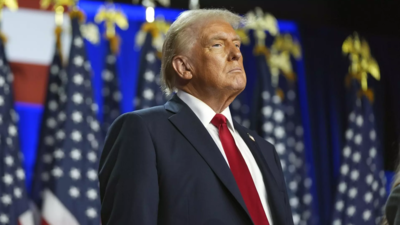
NEW DELHI: In March 2023, defence minister Rajnath Singh had some unusual guests for Holi as commerce secretary Gina Raimondo and her team attended the festivities at his Ashoka Road bungalow. The result was a series of announcements, which extended up to PM Narendra Modi's visit to the US in June 2023. It had taken two years to undo what Trump administration had done in its four years in office.
And, just when the commerce department brass in New Delhi was cheering the smooth ties with Washington, they will have to brace for ensuring that the relations are not strained once Donald Trump walks into Oval Office next Jan. After all, just last month, he called India the "biggest charger" of tariffs. In Sept, he called India a "very big (trade) abuser", keeping it and Brazil just a notch below China.
The rhetoric is no different from his first term when he called India "tariff king" and went on to increase import duty on steel and aluminum by 10-25%, invoking national security provisions. The duty impacted 2.3% of India's trade with the US, and govt responded with retaliatory tariffs on almonds, apples lentils and steel after preferences were also withdrawn by Trump administration.
This time too, he has indicated his preference for "tit-for-tat" tariffs. "So, we're going to do a reciprocal trade. If anybody charges us 10 cents, if they charge us $2, if they charge us 100%, we charge the same," Trump had said ahead of Modi's US trip.
Trump doesn't believe in looking at the average tariff or if the levies are within permissible limits. His attacks are political. "Trump may pressure India to cut tariffs and also impose higher tariffs on Indian goods, especially in sectors like automobiles, textiles, pharmaceuticals, and wines, which could make Indian exports less competitive in US market," said Ajay Srivastava of GTRI.
India isn't unique, countries around the world keep high levies on products that are sensitive. With Trump's return, they are bracing for fresh trade tensions. Given that the president-elect sees China as the "toughest" and India as "tough", the prime focus of his actions is likely to be Beijing.
In any case, in 2023, China's goods exports to the US were estimated at $427 billion - five times higher than India's $84 billion. "He will come down heavily on China. If Trump increases tariffs for countries like India by a lower magnitude than China, then it stands to gain," said Jayant Dasgupta, India's former ambassador to WTO.
This may potentially open the doors for some Indian businesses, provided they have the capacity to produce those goods. Biden administration's tariff hikes of EVs and semiconductors, for instance, will offer virtually no gain to India. Having put the dispute settlement mechanism at WTO in deep freeze by blocking all appointments to the appellate body, the multilateral agency is unlikely to see any action for at least four years.
A carefully crafted partnership can, however, help India tap into America's hunt for critical minerals and technology. The fate of forums like Indo-Pacific Economic Cooperation, a post-Covid platform to counter China, remains unclear under Trump. But trade experts believe that Trump prefers bilateral deals over multilateral or plurilateral agreements.
Which means he may be willing to negotiate deals that demonstrate gains to American businesses, at least to his constituency..














